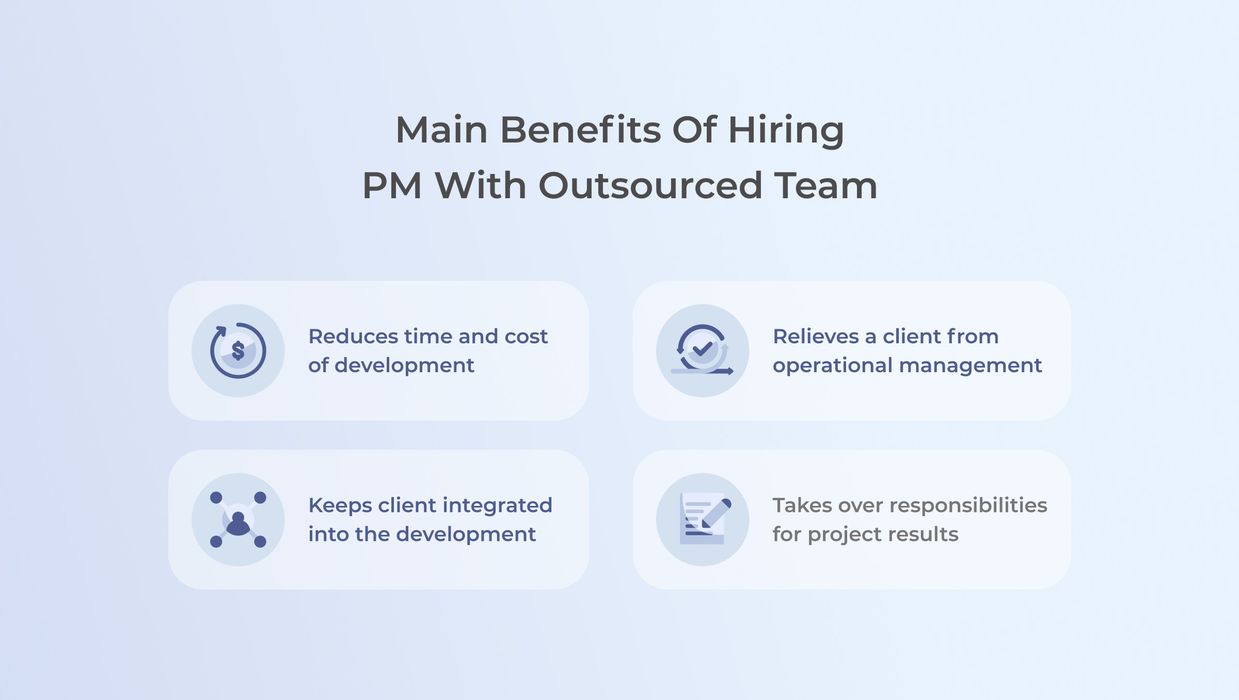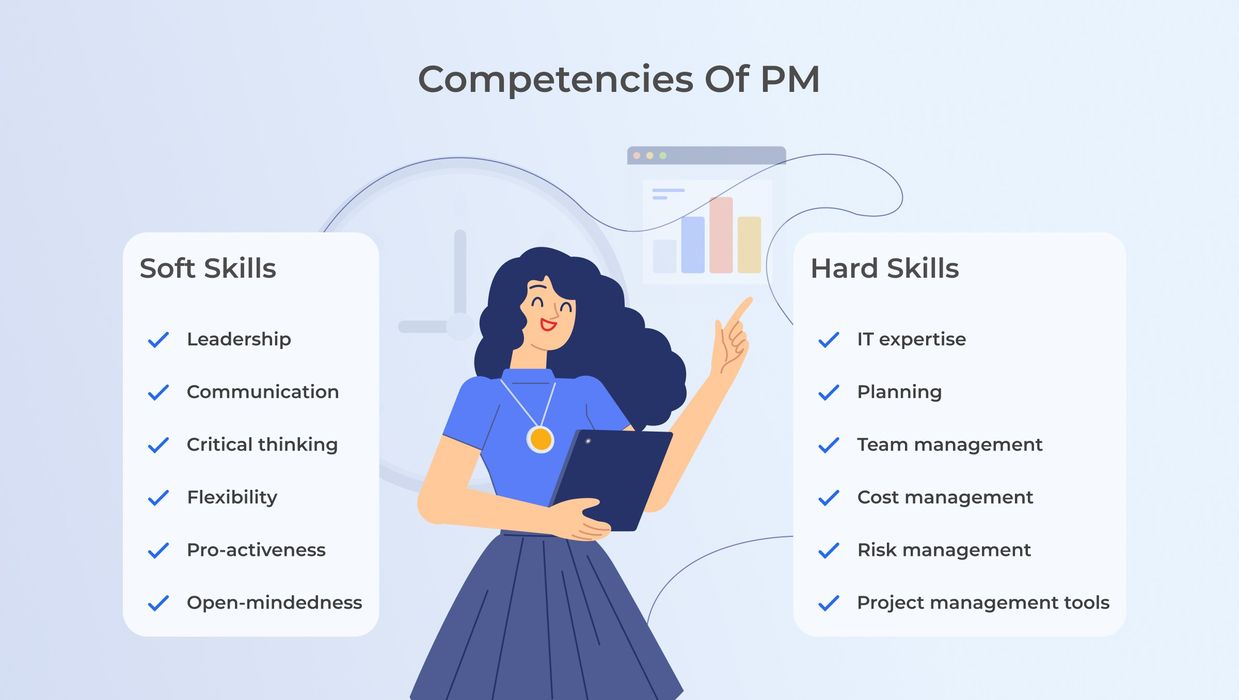Table of Contents
What specialist does your outsourced dream team have? If you’re working on a software solution, you’d probably name developers, QA engineers, designers… You may think that it’s enough, and you’d be right to do so – these specialists have all the skills required for successful project completion.
But there is a missing link, and it’s a Project Manager (PM). They won’t code or design, but their role is no less important.
When hiring a dedicated outsourced team, you can face a lot of difficulties:
- the scope of work may change and make it hard to meet deadlines;
- your budget may become inflated;
- some obstacles may arise and delay or stop the development;
- the lack of technical experience may complicate your decision-making regarding software development.
Adding a PM to your team will help you to solve these issues. We always include a Project Manager when our clients request to work with an outsourced crew, and this strategy has never let us down. After all, development is not only about coding; it’s about preserving deadlines, well-organized teamwork, and thorough control over the key processes. And that’s exactly what a PM is responsible for.
If you are still hesitating whether you need a Project Manager, this article will give you a comprehensive review of the PM position in the development process. We’ll explain what PMs do, what tasks they cover, what project management techniques they use, and what value they bring to your project.
Why do you need a Project Manager?
Despite the common beliefs, the project manager’s responsibilities go beyond creating tasks and checking in with team members. They are in charge of the project success, adherence to the deadlines, communication between the team and the client, and crisis management.
There are some common stereotypes about the importance of Project Managers in the development process. For example, their work is a waste of budget, or it’s possible to manage the development without them. Let us break this myth down.
According to their experience, the involvement of the PM actually reduces the budget and time required for the project completion. Why is that?
Now let’s say you have 40 hours that you want to dedicate to managing a development team. You can either do it yourself or delegate that to a PM. Spoiler alert: delegating them to a PM would be more resultful.
Our PMs are skilled and experienced in leading a development project because they do it every day. They know all the possible pitfalls, allocate resources accordingly, and make a substitution without any idle effort as they know the capabilities of each development team member. So a PM doesn’t need time to adjust and understand the context, unlike the person who has never encountered software development.
But it doesn’t mean a client has no control over the process. On the contrary, a PM works closely with a client but just takes over the operational tasks and allows a client to focus on the strategic aspects. E.g., if you have a PM who manages your project, you can instantly receive all the updates. To keep track of the project development, there are various kinds of meetings you will participate in — planning, grooming, sprint reviews, etc. So all you need to do is monitor the project updates routinely and guide your team if something is not exactly like you wanted it. Your PM will do the rest for your peace of mind. Just imagine how nerve-racking this could have been otherwise.
Simply put, a PM steers the project in the right direction and keeps a client in the loop. But it’s only the tip of the iceberg; there are more advantages you will get by involving a Project Manager. Here are the set of reasons why you need this specialist!
The project’s success
A good Project Manager is a person with an excellent entrepreneurial mindset. This allows them to think about a project from a client’s perspective. It is the Project Manager’s job to lead the team to the finish line. At the end of the day, the project’s outcome rests solely on the Project Manager’s shoulders, and he or she is the one responsible for the result.
Release quality guarantee
One of the PM’s responsibilities in our company is the final inspection before a product release. Before the project goes live, the Project Manager conducts user acceptance testing (UAT) which validates that the app flow matches the real user behavior scenarios. Basically, a PM carries all responsibility for the project delivery, relieving a client from this liability.
Saving a budget
Even if a project meets a customer’s expectations and is delivered on time, it will still be a setback if it goes wildly over budget. A Project Manager frequently reviews the budget and plans it to avoid budget overruns. A PM also monitors the workload of every specialist and helps avoid idle expenses.
Bridge and filter
In simple terms, this skill is called “communication.” Communication is a key for success, especially when the team consists of specialists with different responsibilities. You as a client may not have enough time, desire, or resources to engage fully in communication with every team member. So why not delegate this task to someone who will give it a full priority?
Guidance
Software development is a flexible process, as a lot of changes may arise on the go. You may want to implement some adjustments or test some of your ideas. Or you will want to understand your project more deeply, up to the smallest technical details. A Project Manager is your guide here: they will help you to sort things out, deepen your expertise on both business and technical sides, and provide you with enough data to make an evaluated decision.
Keeping with deadlines
While other specialists may not always keep up with a schedule, a Project manager is the one to monitor deadlines. When planning a project, they always find the optimal decisions based on the teams’ capabilities and experience. A Project Manager will also adjust and reevaluate the schedule if some sudden changes or delays occur to ensure an uninterpreted development process.
Risk management
A PM is your way to secure your project from both uncertainties and unpleasant surprises. A Project Manager knows what risks are possible while working under a certain part of the project. They constantly analyze and isolate the risks to minimize the opportunity of the breakdown. But even if the worst scenario happened, a Project Manager would be skilled to find a solution, minimize the damage and continue the project. It may take a certain amount of stress, but the relief will come knowing that there is a person who is competent to deal with such problems.
Project Manager Competencies in IT
Any Project Manager must be a highly skilled specialist with sufficient knowledge of technologies, deep expertise in different management styles and methodologies. Strong soft skills are another must-have for a Project Manager. Although every person needs them for efficient teamwork, they are extremely important for a PM, as their responsibilities lie in the world of communication and problem-solving.
As you can see, the competencies of a Project Manager are wide and complex. In the beginning, It may be hard to spot them, especially if the management style is different from yours. So give it some time! But there are some skills we suggest checking when you interview your PM for the first time:
For example, Altamira PMs are always in touch with our clients and adjust to the client’s preferred way and time of communication, even if there is a significant difference in time zones. We also invite our clients to the regular sync calls, demos, and welcome thorough feedback during the development process. All our clients get access to the prototypes in Figma or InVision. Our clients can check them anytime there, leave comments there or discuss them on the next calls.
What does a Project Manager do?
When we talk about the outsourced development team, we need to understand that it’s a separate element of the client’s in-house team. It has its own dynamics and an established workflow. A Project Manager is a person who already knows how the team functions and how to organize and optimize their work. On the other hand, a PM gathers all necessary info from the development team and communicates it to the clients
To give you a better idea, we gathered the main responsibilities of our PMs. Here is what we’ve got:
- scheduling and managing calls, regular team meetings;
- scheduling and managing calls, providing updates to the client;
- setting the definition of done and tracking the task progress;
- managing calendars and other digital tools for smooth teamwork;
- creating and managing costs, payments, and communication plans;
- accessing risks, creating a risk management plan; controlling performance, budget, and quality.
PM’s day consists of all kinds of groomings, plannings, team and one-to-one meetings, risk management activities, and even more. A lot of routine activities may not be apparent, so you might get a wrong impression when estimating the PM’s workload sometimes.
Let’s agree, the amount of work is impressive, and it is impossible to divide or delegate it to any other member of the outsourced team. We also suggest sticking with the Project Manager who already knows the team and needs no time for adjustment.
Why we use Agile for Software Project Management
There are different methodologies in IT project management. The most popular are Waterfall (which is a traditional approach) and Agile. Altamira follows Agile and here we will explain why and what it implies.
Agile stands for flexible practices in software development. It appeared in 2001 with a Manifesto for Agile Software Development and has been gaining popularity since then. The main point of this methodology is to focus on the product and not the process, creating a cross-functional team, and implementing changes easily during the development.
How does it work? After the discovery stage, when we have prepared specifications and understood the required features, we evaluate the scope of the whole project and break it into smaller parts – epics. Each epic is dedicated to developing every user story, or the feature the user will interact with. It might be signing up, creating a profile, or a chatting option. Every feature is done within one epic: that’s why an epic always involves every specialist in your development team: developers, designers, QA engineers, etc.
So here are some benefits Agile gives a client and us:
- you have a functioning application at any stage of development;
- a cross-functional team is working on the project and this guarantees full involvement of each specialist instead of their partial responsibility;
- it’s possible to adjust the plan and add changes on the go;
- this approach makes MVP development even easier: you can start with 10 epics, for example, and quickly get a basic, ready-to-use application, and then refine it later.
But the whole concept won’t work without a Project Manager. In Scrum (one of the Agile frameworks) PMs are called Scrum Masters. Scrum Master is usually responsible for implementing the Scrum framework, team coaching, removing roadblocks, and facilitating regular team meetings. There are different views on the roles of PM and Scrum Masters, and a lot of companies adjust classic Scrum practices to their needs and comfort. Our Project Managers often act as Scrum Masters as well as handle more traditional project management tasks, like timeline or cost planning.
In conclusion
Don’t consider a Project Manager as an optional addition to your outsourced development team. PM is a must for successful, efficient development. They take the routine part of the project away and keep you focused on a bigger view, your project goals, and performance.
In our experience, clients usually appreciate the decision to hire a Project Manager, even more so when they see the final result. PMs keep clients engaged in the development and give the expertise required for decision-making.
Another benefit of hiring a PM is the fact that they are totally focused on your project. You will have a person who will monitor closely every step of development, who will be alert to remove obstacles or solve sudden issues. It’s also cost-effective to have a skilled specialist leading the development, as they go straight to the goal without deviations or idles. Consider adding a Project Manager as an investment in your project, as well as a way to decrease your own stress and workload!





